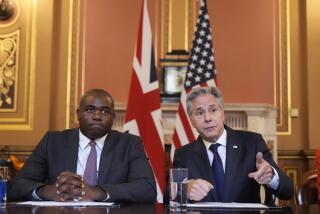U.S. Sees Soviet Blackmail in Missile Parade in Kabul
- Share via
WASHINGTON — The Reagan Administration, escalating its criticism of a Soviet arms buildup in Afghanistan, accused Moscow on Tuesday of trying to blackmail the pro-Western government of Pakistan by parading ballistic missiles through the streets of Kabul.
State Department spokesman Charles Redman said the Scud-B missile, apparently identical to a weapon used by Iraq in the war-of-the-cities phase of its conflict with Iran, has a range that could put much of western Pakistan at risk.
“If the purpose of these latest military developments is to threaten Pakistan, the Soviet Union knows that Pakistan enjoys our full support,” Redman said.
But when asked how Washington would respond to a Soviet attack on Pakistan, Redman dismissed the question as hypothetical.
‘Great Destructive Power’
In Moscow, the Soviet news agency Tass said the Soviet Union has supplied the Afghan army with missiles of “great destructive power” that would be used against the U.S.-backed Islamic insurgents fighting to topple the Soviet-backed Afghan regime. Tass said the missiles had been paraded through Kabul, the Afghan capital.
A senior State Department official scoffed at Soviet statements that the missiles would be used against the moujahedeen guerrillas. He described the Scud as “a terror weapon” because its range, payload and relative inaccuracy make it far more effective against civilian population centers than against military targets.
U.S. military assistance to the moujahedeen is funneled through Pakistan. Moscow, focusing on Pakistan as the weak link in the rebels’ supply chain, has sought to pressure the Pakistani government into ending its support for the insurgents.
‘Desperate Regime’
On Monday, before the delivery of the Scud missiles was reported, Undersecretary of State Michael H. Armacost protested to Soviet Ambassador Yuri V. Dubinin over raids against moujahedeen positions near the southern town of Kandahar by Soviet Backfire bombers. Armacost also complained about Soviet deployment of MIG-27 fighter-bombers in Afghanistan.
Redman said the Backfire raids continued Tuesday, and he added: “This display (of Scuds) is only the latest attempt by the Soviets to prop up a desperate regime which lacks legitimacy among the Afghan people and clearly demonstrates that the regime is incapable of defending itself.”
The Scud-B is capable of carrying an 1,100-pound, high-explosive warhead about 190 miles. Islamabad, the capital of Pakistan, is about 200 miles from Kabul. The Pakistani border town of Peshawar, a base for many rebel groups, is well within the range of Scuds deployed in the Afghan capital. But the missile is so inaccurate that it is expected to hit within a half-mile of its target only half the time.
On Monday, Soviet Foreign Ministry spokesman Gennady I. Gerasimov said that Moscow is stepping up arms shipments to Afghanistan, including the “most advanced” weapons in the Soviet arsenal, in order to counter increased Pakistani arms supplies to the moujahedeen.
A statement by the Afghan general staff, made public in Afghanistan and carried by Tass on Tuesday, said that “extremists, instigated by their Pakistani patrons,” have not heeded warnings to stop shelling populated areas in Afghanistan.
Redman said Monday that the Soviet government had assured the United States that it would refrain from offensive operations in Afghanistan except to protect its own troops during their withdrawal.
Under the Geneva accords signed last April, Moscow agreed to withdraw half of its estimated 115,000 troops by Aug. 15 and the rest by Feb. 15. Redman, noting that the Nov. 15 deadline was met, said the United States has no reason to doubt that the Soviets will complete their pullout on schedule.
More to Read
Sign up for Essential California
The most important California stories and recommendations in your inbox every morning.
You may occasionally receive promotional content from the Los Angeles Times.













